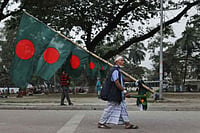Delhi LG V K Saxena on Saturday directed officials to develop constructed wetland systems for natural treatment of sewage water over major drains in the national capital similar to that of the Neela Hauz biodiversity park.
Saxena visited the Neela Hauz Bio-diversity park developed by the Delhi Development Authority (DDA) in south Delhi.
Walking through the scenic "Constructed Wetland System (CWS)", the LG described it as an exemplary model of urban rejuvenation and appreciated the DDA for developing and maintaining the park, said officials.
After witnessing the natural water treating system that includes in-situ remediation of sewage water through two oxidation and stabilisation ponds, filtration zone and aquatic plants without using any power, and the quality of treated water thereof, he instructed officials to explore the possibility of developing such systems over other major drains in the city, they added.
Neela Hauz Biodiversity Park has been developed as the Neela Hauz Lake, which is a natural waterbody and used to supply drinking water to South Delhi. It was nearly extinct due to urbanisation and the construction of the Aruna Asif Ali road bridge across the lake by the Public Works Department (PWD), said officials.
The lake has been restored through desiltation and excavation of solid waste dumps, in-situ biological remediation of 1 MLD of raw sewage – the only source of water to the lake, use of desilted and excavated material for making embankment and development of vegetation on the embankment to maintain the water quality.
It has been restored through the development of an integrated Constructed Wetland System (CWS) – a nature-based solution for in-situ remediation of raw sewage – and the use of treated water for restoration of the lake. The CWS design works on the same principle as that of STP without energy.
The integrated wetlands make 1 MLD of raw sewage into clean water which has the same quality as that of river water and all the water quality parameters (dissolved oxygen, pH, total suspended solids, total dissolved solids, Biological oxygen demand, chemical oxygen demands, ammonia, nitrogen and phosphates) are lower than the permissible limits prescribed by the Central Pollution Control Board (CPCB).
(With PTI inputs)


























